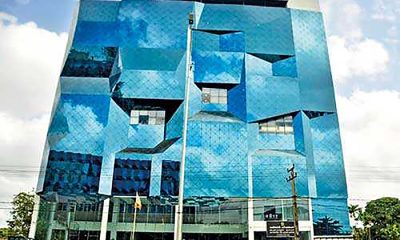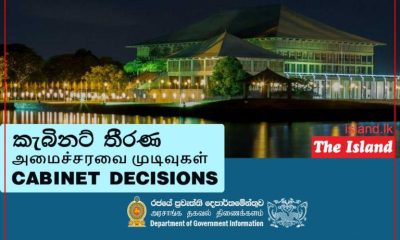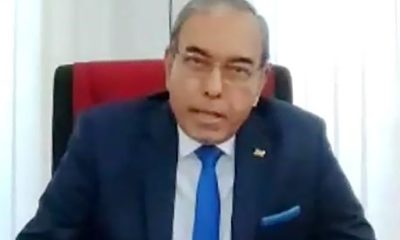Editorial
When failed regimes fear polls

Monday 9th January, 2023
The government is trying every trick in the book to postpone the local government (LG) elections. It would have the public believe that it will not bring in new laws to put them off, but it certainly knows more than one way to shoe a horse. The Election Commission (EC) is said to be divided on whether to conduct the LG elections amidst the present crisis. The government has said it does not interfere in the affairs of the EC, but it will have its work cut out to make the public believe that it has nothing to do with the divided opinion within the EC. Even the COPE (Committee on Public Enterprises) has complained that the Executive is meddling with its work.
Some members of the so-called independent commissions are not independent, at all. The Executive has them under its thumb. Ranjan Ramanayake’s leaked telephone recordings have revealed that the ‘Sherlock Holmes’ of the Sri Lanka Police unashamedly offered to stoop so low as to wash pots and pans at politicians’ houses. Chairman of the Police Commission Chandra Fernando had to wipe the egg off his face a few weeks ago, having greeted SLPP National Organiser and former Minister Basil Rajapaksa during a political event at the BIA upon the latter’s return from the US. Constitutional provisions alone cannot make officials or institutions independent.
President Ranil Wickremesinghe is reported to have met the EC members and asked them to reach a consensus and make their final decision on the LG polls known soon. Is it that they would not have done so but for the presidential directive? The JVP has rightly pointed out that the President should not summon the members of the EC after the announcement of dates for submitting nominations because he is a party leader and such action amounts to undue influence on the EC.
There is no way the EC can make a U-turn now without plunging the country into turmoil. It has crossed the Rubicon by calling for nominations. If it ever tries to put off the LG polls, it will provoke the Opposition and the public into staging street protests.
The raison d’etre of any election commission is to hold elections and not to postpone them on one pretext or the other. We have had elections during the country’s wars on northern and southern terrorism, and the worst-ever global pandemic. Therefore, the EC must not sully its reputation by helping the government delay the LG polls further for political reasons. Funds have already been allocated to the EC from Budget 2023, according to the Opposition, and nothing can justify the government’s efforts to delay elections for fear of losing them.
The people are incensed beyond measure. Those who have bankrupted the country and caused so much suffering to the public are still in power, and living the high life. Some of them are even threatening to get tough with the anti-government protesters.
People are furious with the government, which they are all out to punish electorally or otherwise. The least the government can do to prevent another wave of mass uprisings is to let the public vent their anger in a democratic manner through the ballot. If they are denied an opportunity to do so at the LG polls, their pent-up anger is likely to drive them to pour into the streets again. The police, the military and the pro-government goon squads are no match for People Power, which is as unstoppable as the landfall of a tsunami.
Unless the government plucks up the courage to suffer a slap across its face at the hands of the public in the form of an electoral defeat, it will witness a situation far worse than the uprisings that led to the ouster of President Gotabaya Rajapaksa.Meanwhile, the laws that enable the government in power to postpone, advance and stagger elections according to the whims and fancies of its leaders only make a mockery of the people’s franchise as well as sovereignty. It is high time they were done away with for the sake of democracy.
Editorial
Flawed drug regulation endangers lives

Thursday 18th December, 2025
Serious concerns raised by Sri Lankan medical professionals over the quality of some batches of the Ondansetron injection, manufactured by Maan Pharmaceuticals, Ltd., India, and the subsequent withdrawal of them from hospitals here, have shed light on a bigger issue. The use of nine other parenteral products has been suspended with immediate effect, according to media reports. They will be subjected to quality assessment, the National Medicines Regulatory Authority (NMRA) has said.
Spokesman for the Government Medical Officers Association (GMOA) Dr. Chamil Wijesinghe has stressed the need for thorough tests on Ondansetron. He has told the media that the NMRA is responsible for testing imported pharmaceuticals for quality. However, Health Minister Dr. Nalinda Jayatissa has told the media during the weekly post-Cabinet media that not all drugs imported by Sri Lanka are tested by the NMRA for quality, as it lacks laboratory facilities to do so, and drugs are tested rigorously only if there are complaints of adverse reactions. Is it that the NMRA goes by what pharmaceutical companies say about their products when it approves medicines? The present-day politicians and the health panjandrums have not learnt from the procurement of fake cancer drugs during the previous regime.
Minister Dr. Jayatissa has sought to give the drug controversy a political twist. He has said Ondansetron manufactured by Maan was approved for five years, in 2022, the implication being that the previous government was responsible for the registration of the drug. He hastened to add that proper procedures had been followed in procuring it. Interestingly, among the four batches of Ondansetron found to be contaminated, two were imported under the current dispensation! The NPP government has passed laws to deprive the former Presidents of their retirement entitlements and evict them from their official residences, and it came to power, promising to renegotiate the IMF agreement. So, cancelling the registration of any drug that does not meet stipulated standards should be child’s play for the powerful NPP administration.
On the question of quality issues concerning Indian drugs, it is worth recalling that in the late 1980s, the JVP assassinated Chairperson of the State Pharmaceutical Corporation Dr. (Mrs) Gladys Jayewardene for importing drugs from India, which the JVP likened to a giant octopus spreading its tentacles over Sri Lanka. About three and a half decades on, the JVP-led NPP government has gone to the extent of recognising the Indian Pharmacopoeia amidst protests from Sri Lankan medical professionals!
Dr. Chamal Sanjeewa, who leads the Doctors’ Trade Union Alliance for Medical Civil Rights, has said more than 100 batches of medicines imported from India have been withdrawn during the past two years or so due to concerns about their quality. Flaying the Health Ministry, the NMRA, and State Pharmaceutical Corporation for serious flaws in drug regulation, he has called for the resignation of the top officials responsible for ensuring the quality of imported medicines. Health Minister Dr. Jayatissa should also resign as he has retained the officials responsible for the registration of substandard and falsified drugs in the past, Dr. Sanjeewa has said. The most serious issue, in our book, is that the NMRA is without adequate laboratory facilities to conduct stringent quality tests on all medicines it approves, and apparently takes leaps of faith, leaving patients at risk. Successive governments have paid lip service to the need for state-of-the-art labs to test medicines and ensure that they meet international standards. The NMRA must be fully equipped to test all drugs properly before they are approved, and no room must be left for the import of substandard and falsified medicines.
According to the World Health Organization (WHO), at least one in 10 medical products in low-and middle-income countries fails to meet quality standards or is falsified. This shows the enormity of the problem of falsified and substandard drugs. Quality failures of pharmaceuticals not only harm patients directly but also impose large economic burdens on individuals and health systems, including wasted resources on ineffective treatments and costs related to managing adverse effects, WHO has pointed out. The need for a thorough investigation to find out why the NMRA approved the aforesaid drugs cannot be overstated.
Editorial
Colombo Port facing strategic neglect

Wednesday 17th December, 2025
The Colombo Port is always in the news for the wrong reasons. More than 300 container trucks loaded with cargo are waiting within its premises due to a clearance delay, according to a report we published yesterday. The Container Transport Vehicle Owners’ Association has urged the government to take action to eliminate the port delays forthwith. It has warned that there will be a shortage of essential commodities soon if delays persist. Additional expenditure incurred by the truck operators due to port delays will be passed on to the public, the association has said. One of the reasons for these delays is said to be the inflow of disaster relief materials that need to be cleared on a priority basis. However, the Colombo Port experiences delays even when there is no influx of disaster relief.
Port delays take a heavy toll on exports as well. As we have pointed out in a previous comment, quoting a former Navy officer, the Coast Guard personnel are qualified to handle Customs operations and they can be called in to help ease port congestion. The government should seriously consider doing so.
In January 2025, protracted delays in the Colombo Port jolted the government into purportedly devising ways and means of doing away with them. But the problem is far from over. The government made use of the delays to have 323 red-flagged containers released via the green channel without Customs checks. The possibility of racketeers making the most of the current situation to have containers carrying contraband green-channelled cannot be ruled out. The Opposition, the media, trade unions and port workers must remain vigilant to thwart such a move.
Delays drive away major shipping lines. It has been reported that several international shipping lines have opted to bypass the Colombo Port, which is facing escalating congestion due to various factors related mainly to capacity and efficiency.
What the NPP government and the top port officials must realise is that the Colombo Port is not the only girl on the beach, as it were. India’s newly built Vizhinjam port is becoming a major attraction for international shippers who are averse to delays. In global logistics, shipping lines place very high value on on-time delivery, reliability and efficient operations.
Vizhinjam poses numerous challenges to the Colombo Port. The government must take cognisance of this reality and make a serious effort to enhance the efficiency and capacity of the Colombo Port to retain the transhipment traffic historically routed via Colombo. There is a strong possibility of shipping lines rerouting feeder services away from Colombo to Vizhinjam, adversely impacting Colombo’s network role, as shipping experts have warned.
Vizhinjam has several key advantages over Colombo. It advertises itself as a deep-water port with a 24 m natural draft, which enables it to accommodate ultra-large container vessels without dredging; its proximity to the main east–west shipping route helps vessels to call without significant deviation, reducing voyage time and costs. Automation, modern cranes, faster turnaround times, enhanced operational efficiency and attractiveness to shipping lines are other advantages India’s new port has over Colombo.
Experts have urged Sri Lanka to adopt a viable mitigation strategy to face competition from Vizhinjam effectively. The Colombo Port has to enhance its efficiency, cost proposition, capacity, and service differentiation, while strengthening its role as a comprehensive logistics and maritime hub rather than a pure transshipment stop, they have pointed out. Sadly, successive governments have ignored expert opinion and done precious little to retain the Colombo Port’s competitiveness, much less prepare it to face future challenges. They have only adopted piecemeal remedies and, worse, turned the premier port into a playground for rival global powers.
The incumbent government has failed to make a difference despite its rhetoric. If strategic modernisation and operational improvements are not effected to the Colombo Port urgently to enable it to eliminate delays and enhance its efficiency and the quality of its service significantly-à-vis the emerging rival facilities in the region, it will run the risk of diminishing its relevance.
Editorial
Bondi Beach and Arugam Bay

Tuesday 16th December, 2025
It was with shock and dismay that the world received the news about Sunday’s cowardly terror attack on a group of Israelis in Australia. Sixteen lives were lost and about 40 others injured in the Bondi Beach mass shooting, which followed an increase in anti-Jewish incidents in Australia after Israel’s invasion of Gaza, where 70,000 Palestinians have perished at the hands of the Israeli military.
Israel has doubtlessly made Hamas regret its 2023 incursion, indiscriminate killings and mass hostage-taking. But the Netanyahu government has incurred much international opprobrium by unleashing disproportionate violence and carrying out attacks on civilian targets. Worse, the Bondi Beach attack has demonstrated the growing vulnerability of Israeli citizens overseas.
Hamas has had to agree to a ceasefire, and faces the prospect of having to disarm. Israel may obliterate Gaza, but victory will still elude it. Hamas may carry out more attacks on Israel, and its sympathisers may target Israeli civilians, but Palestinians will not benefit from such acts of violence. Only peace will benefit the warring sides and civilians. The problem is best tackled at source.
The need of the hour is for the world to strengthen the Gaza ceasefire and make it work by ensuring that both sides refrain from violating it. That is what US President Donald Trump was expected to do. Last month, the United Nations Security Council adopted a US-sponsored resolution that enshrined Trump’s 20-point plan, including the mandate to set up a multinational force for Gaza, but not a single nation has formally committed troops to it yet, according to media reports.
Unfortunately, instead of intensifying his focus on resolving the Gaza conflict and other disputes in keeping with his pre-election pledges, President Trump appears to be busy enacting scenes from Pirates of the Caribbean, hijacking ships and sinking boats off Venezuela, while eying the Nobel Peace Prize, of all things.
Meanwhile, Sri Lanka must keep its guard up. There are Israeli tourists here. In October 2024, the US embassy, followed up by Sri Lankan police and Israel’s National security council, warned of serious terrorist threats to Israelis holidaying in the Arugam Bay area. Thankfully, what was feared did not come to pass, but no room must be left for complacency.
Sri Lanka must take the Bondi Beach attack as a warning and brace itself for any eventuality. A terror attack on its soil is something it needs like a hole in the head while struggling to manage the impact of a natural disaster and keep the economy on track.
The economic cost of the Ditwah disaster has not yet been calculated, but Commissioner General of Essential Services Prabath Chandrakeerthi has given a ballpark figure—USD 6 -7 billion or about 3 – 5 percent of GDP. This is a staggering amount. The economic crisis is far from over. The government has its work cut out to allocate funds for rebuilding programmes and is therefore seeking assistance from other nations. But whether foreign aid will be sufficient for the post-disaster reconstruction projects in all 25 districts, affected by Ditwah, remains to be seen, as we argued in a previous comment. The country is therefore heavily dependent on tourism to shore up its foreign currency reserves. One may recall that the 2019 Easter Terror attacks crippled the tourism sector, and contributed to the forex crisis by depriving the economy of billions of dollars a year.
Sri Lanka cannot take any more shocks, and everything possible must be done to neutralise threats to its national security and prevent it from suffering the same fate as the proverbial man who was gored by a bull after falling from a tree.
-

 Business7 days ago
Business7 days agoCabinet approves establishment of two 50 MW wind power stations in Mullikulum, Mannar region
-

 Features4 days ago
Features4 days agoWhy Sri Lanka Still Has No Doppler Radar – and Who Should Be Held Accountable
-

 Features6 days ago
Features6 days agoDitwah: A Country Tested, A People United
-

 News6 days ago
News6 days agoRs 1. 3 bn yahapalana building deal under investigation
-

 News7 days ago
News7 days agoCabinet approves the transfer of the constructions and land reserved for the Kiinniya University to the Ministry of Foreign Affairs, Foreign Employment, and Tourism
-

 Opinion6 days ago
Opinion6 days agoComfort for some, death for others: The reality of climate change
-

 Business6 days ago
Business6 days agoFluctuating fortunes for bourse in the wake of selling pressure
-

 News6 days ago
News6 days agoFormer SAARC SG Esala Weerakoon calls for ‘South Asian Climate Compact’













